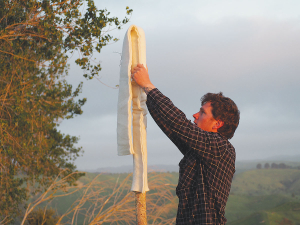Top wool advocate bales out
The conversion of productive farmland into trees has pretty much annihilated the wool industry.
 The Wool Pole Protectors offer an opportunity to replace traditional protectors, that are usually made from plastic, with a breathable product that allows the bark layer of new plantings to harden off naturally.
The Wool Pole Protectors offer an opportunity to replace traditional protectors, that are usually made from plastic, with a breathable product that allows the bark layer of new plantings to harden off naturally.
While wool returns continue in the doldrums, smart sheep farmers are looking for alternatives for a product that currently cost more to get off a sheep's back than it's worth. One such initiative is run by husband and wife team Hayden and Anastasia Tristram who farm at Wanstead in the Central Hawke's Bay. Mark Daniel reports.
After exiting a career in the NZ Army, the couple decided to return to Hayden's roots and took over the lease of a 400ha family-owned property.
This is run alongside an 89ha unit they also own nearby. The steep country operation carries 1500 breeding ewes, complemented by a herd of 60 breeding cows made up of pure Angus and Friesian/Hereford crosses.
Consistently disappointed by the returns from their wool clip, the couple brainstormed and thought about what more could be done with not just the land, but also the wool. After numerous conversations at the end of 2021 - over a beverage or two - they decided to take a shot and get their strong ewe wool. After numerous conversations at the end of 2021 - over a beverage or two - they decided to take a shot and get their strong ewe wool turned into a product with added value.
Since 2022, quality fleece wool shorn on the farm is sent for scouring in Napier, then on to Auckland for felting, before manufacturing both there and in Hawke's Bay. Retailed under the Floating Peaks brand, the business offers wool pots, seed beds, gift packs, weed mats and a free educational workbook for primary school students called "The Wool Journey".
More recently, the product range has been added to, with the arrival of Wool Pole Protectors. All products are 100% wool-based, assembled using 100% cotton thread and 100% biodegradable.
The Wool Pole Protectors have certainly come to the fore, following the ravages of Cyclone Gabrielle, offering a realistic opportunity to replace traditional protectors that are usually made from plastic. Used extensively on the home farm, where record rainfalls and erosion are the norm, the pole protectors have withstood the elements without any issues.
Currently undergoing extensive trial work throughout the country - from Northland through the King Country and Gisborne areas, alongside Canterbury and as far as Te Anau - users are reporting results with the new product.
"It's important to understand that we only use quality fleece wool for our products - there is no place for dags or damaged wool, as trials have proven them less durable," explains Anastasia Tristram.
The couple concede that fitting takes slightly longer than the plastic alternatives, but the core material offers a wide range of benefits - not least the protection it offers over the investment in planting trees, often on steep, erosion-prone land.
Beyond this, the wool protectors are breathable, allowing the bark layer of new plantings to harden off naturally. Meanwhile, the wool is hygroscopic - meaning moisture is absorbed and released as needed, creating the best habitat for the growing tree.
Manufactured to 100g per square metre grade than the original plastic product, with the benefit of being natural, renewable and 100% biodegradable, the protectors are designed to start breaking down at around two years, depending on conditions.
This compares to plastic protectors, which having been split as the tree matures, can be found lying on the ground, in some cases 15 years later.
"We wanted to add some value to our wool, but more importantly we wanted to create a cost effective and renewable alternative to plastic, while using nature's finest fibre," Anastasia adds. "The results have been so good, to date, that we have committed the whole of this year's clip to the felting process and our biodegradable products. This year is about encouraging farmers and landowners to give Wool Pole Protectors a go and letting the results speak for themselves."
Brand Fit
The Floating Peaks brand evolved from the elevated position of the Tristram's home, which offers extensive views of the Porangahau Coast.
On colder mornings, clouds form in the valley below with only nearby peaks are visible. This gives the effect of plants growing in a bed of wool.
Legal controls on the movement of fruits and vegetables are now in place in Auckland’s Mt Roskill suburb, says Biosecurity New Zealand Commissioner North Mike Inglis.
Arable growers worried that some weeds in their crops may have developed herbicide resistance can now get the suspected plants tested for free.
Fruit growers and exporters are worried following the discovery of a male Queensland fruit fly in Auckland this week.
Dairy prices have jumped in the overnight Global Dairy Trade (GDT) auction, breaking a five-month negative streak.
Alliance Group chief executive Willie Wiese is leaving the company after three years in the role.
A booklet produced in 2025 by the Rotoiti 15 trust, Department of Conservation and Scion – now part of the Bioeconomy Science Institute – aims to help people identify insect pests and diseases.

OPINION: The release of the Natural Environment Bill and Planning Bill to replace the Resource Management Act is a red-letter day…
OPINION: Federated Farmers has launched a new campaign, swapping ‘The Twelve Days of Christmas’ for ‘The Twelve Pests of Christmas’ to…